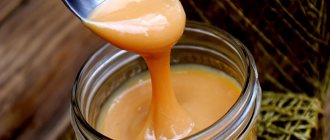The benefits of condensed milk
Everyone loves condensed milk! Its sweet taste cannot leave us indifferent! It is prepared by condensing cow's milk and adding sugar to it.
Condensed milk is a source of animal protein necessary for the body. It is similar to human proteins.
If condensed milk is of high quality, it is completely absorbed in the body, enriching it with useful substances.
The calcium contained in condensed milk helps strengthen bones, nails, teeth, and improve vision. In addition to calcium, condensed milk contains phosphorus salts, which are responsible for brain activity and blood restoration.
Beneficial features:
- calcium and other nutritional components have a positive effect on the body;
- immune system support;
- digestion support, stool stabilization;
- due to its protein content, it is suitable for weight loss (provided there is no sugar in the composition);
- healthy development of bones, joints, teeth;
- prevention of atherosclerosis and osteoporosis;
- proper thyroid function;
- support for memory and proper brain activity.
Lactoferrin and lysozyme also stimulate the immune system, further optimizing the creation of bone tissue. The iodine present in condensed milk is important for the development of the baby's central nervous system.
Note! Don't be afraid of animal protein! Yes, its large consumption burdens the body, but it is necessary in moderation.
Can a nursing mother have condensed milk?
The effect of condensed milk on the quantity and quality of breast milk is a controversial issue. It is not harmful either to the mother herself or to the newborn baby. But it is important to consider some points. The product is not dietary because it contains a lot of sugar and fat. Cow's milk protein may cause allergies in susceptible individuals. Therefore, you should start using small portions.
Is it possible for a nursing mother to have boiled condensed milk?
Similar rules apply to boiled condensed milk. It has the same content of sugar, fat, and milk protein. But the benefits are also important! The calcium and phosphorus salts mentioned above are not destroyed by cooking. Thanks to this, boiled condensed milk is not inferior in nutritional value to raw milk.
Can mothers have boiled condensed milk?
Boiled condensed milk is a fairly strong allergen, as it contains a lot of sugar and cow protein, therefore, like simple condensed milk, it should be taken with great caution. Introduce boiled condensed milk in small doses into the diet no earlier than six months after the birth of the child and monitor the baby’s health. By this time, the baby’s body will have already learned to develop its own defenses and respond to the introduction of new products.
Condensed milk is not only tasty, it is also healthy; it can be safely consumed by the mother while breastfeeding, but be sure to adhere to the daily norm. Because even after cooking, boiled condensed milk retains many useful elements, calcium and cow protein. In case of an allergic reaction or other ailments of the baby, the use of any condensed milk is strictly prohibited, so as not to cause even more serious problems in the child’s health.
Condensed milk is a healthy dairy product, but due to the high content of sugar and cow's protein, a nursing mother should definitely refrain from excessive consumption and adhere to the daily intake. During pregnancy, as well as during breastfeeding, mothers should pay special attention to the composition of the ingredients of the products they consume and their freshness. The food products consumed by a woman in labor should not contain any preservatives, artificial additives or various chemicals.
It is important to remember that all the food that a mother eats while breastfeeding enters the baby’s body through breast milk. Proper and balanced nutrition will be beneficial not only for the mother, but also for the baby. Only in this case will it be possible to provide the child with good health and good immunity in the future.
Which condensed milk should I choose?
Condensed milk has long been used in the preparation of homemade confectionery (remember anthill cake, waffle cake, nuts?). You can drink coffee or tea with the addition of a sweet dairy product, or add it to breakfast, for example, oatmeal.
The taste and quality of prepared dishes depends on the condensed milk itself. Therefore, the choice should be taken seriously.
Condensed milk contains about 35% proteins, organic acids, minerals, vitamins - substances necessary for the body. Consequently, it can replace raw milk in the diet and compensate for the lack of meat (provided there is no sugar in the composition).
Excess sugar and fat balances the beneficial properties of the product. Therefore, when buying condensed milk, purchase a low-fat, sugar-free product.
Complete composition of vitamins (per 100 g):
- D - 0.55 μg;
- E - 0.19 mg;
- B3 - 0.14 mg;
- B6 - 0.09 mg;
- B12 - 0.8 mcg;
- K - 4 mcg;
- biotin - 2.5 mcg;
- folic acid - 8 mcg;
- pantothenic acid - 0.75 mg.
Saturated acids:
- palmitic – 30%;
- myristic - 12%;
- stearic – 11%;
- other fatty acids - 11%.
Unsaturated acids:
- oleic - 24%;
- palmitoleic – 4%;
- linoleic acid - 3%;
- linolenic – 1%.
Protein is important for tissue growth. The protective function is reflected in blood clotting.
Fat - ⅓ of milk fat is unsaturated acids that have a beneficial effect on the vascular system.
Sugar – Milk sugar does not cause tooth decay, unlike sucrose.
Is condensed milk ok when breastfeeding a baby?
Some women believe that tea with the addition of condensed milk increases lactation, as well as the fat content of milk. Others doubt whether mothers can use condensed milk while breastfeeding.
More recently, experts themselves advised including this product in the nursing menu, but modern research shows that too sweet foods have an adverse effect on the development of the baby. Still, it’s worth taking a closer look at this issue and understanding whether this product should be included in the diet of mothers who are breastfeeding their baby.
Rules for introducing into the diet
To prevent harm, check your child's allergies. You need to eat 1-2 tsp. dairy product, and monitor the child throughout the day.
If there is no change, drink milk.
Note! The recommended amount is 2-3 tbsp. in a day. A woman who is breastfeeding should start using 1-2 tsp, gradually increasing the amount.
Recommendations:
- to buy a high-quality product, make sure that it is produced in accordance with GOST (information is on the can);
- pay attention to the expiration date;
- Do not eat condensed milk during the first month after giving birth.
Including condensed milk in the diet
Pediatricians advise introducing condensed milk during breastfeeding into the mother's menu in the morning, in small portions, since throughout the day the woman should observe how the baby behaves. In the absence of any changes, it is allowed to eat up to two tablespoons of sweetness. l. (about 40 g/day).
When breastfeeding, a woman should eat properly and exclude a large number of sweets from the menu. Abuse of such products negatively affects the health of the baby and the mother herself. A regular can of condensed milk (weighing 0.25 liters) contains 1200 kcal. During lactation, the metabolism of a young mother undergoes some changes, so regular consumption of a sweet product can lead to excess weight gain. Boiled condensed milk is contraindicated during breastfeeding, as it loses most of its beneficial microelements during cooking.
Rules for use during lactation
There is a myth that condensed milk for lactation is good as an additive to tea, as it increases milk production. This is partly true, but milk production is stimulated not by condensed milk, but by hot tea. You can just as easily drink any warm drink, even ordinary warm water, this will stimulate lactation. In addition, lactation is well stimulated by frequent latching of the baby to the breast, sleeping together, wearing in a sling, frequent hugs and kisses, and a lot of contact between baby and mother. Tea with condensed milk is allowed during breastfeeding, but it does not affect the amount of milk produced.
By adhering to proper nutrition, any nursing mother will be able to quickly and easily establish lactation in the first months after childbirth. In nutrition, it is necessary to adhere to simple rules so as not to overload the bodies of the mother and baby with excess calories and carbohydrates. Preference should be given to natural foods, excluding the introduction of products with artificial additives, flavors and preservatives.
If you want to enjoy condensed milk during lactation, it is better for a nursing mother to choose condensed milk in accordance with GOST, in this case it will be as natural as possible and will not contain artificial colors and preservatives.
Can a mother consume condensed milk while breastfeeding?
But it happens that a woman has doubts about what she can eat and what not. Indeed, while breastfeeding a baby, it is necessary to approach the intake of various foods with great caution. And sometimes you want to eat something tasty, for example, condensed milk. This text material will help you understand which foods can be consumed while breastfeeding, and which are strictly contraindicated.
Can a nursing mother have condensed milk? Mommy often wonders what can be included in the diet and what should not be included at all. And, making a mistake, women sometimes act incorrectly, trusting the Internet or the advice of friends, and eat whatever they want. And in the future, everything affects the baby.
Problems with breastfeeding can result in allergic reactions and poorly passed stools or even constipation. And all this is complicated by unpleasant consequences and drags on for a long time. During breastfeeding, it is very important for the mother to maintain the correct diet, with a properly selected menu. After all, she is responsible not only for herself, but also for the baby.
Is it possible to have condensed milk while breastfeeding? Nature itself dictates that a baby needs to be fed with breast milk. It is believed that it is the most nutritious and most suitable, since it contains useful elements necessary for the baby’s body, which contribute to its growth and proper development.
A child who receives the amount of milk he needs is in a wonderful and contented mood. And he is also very calm, because he is full, and his stomach works correctly and stably. But how beneficial milk will be depends largely on the mother herself. The foods she eats affect the quality of her milk.
A properly selected diet is very important. You should not abuse sweets, candies, or chocolates. But as for condensed milk, beloved by everyone, whether it can be eaten during breastfeeding raises a number of doubts and disagreements among experienced specialists.
Is condensed milk good for breastfeeding? Unhealthy food consumed by a nursing mother can later lead to the baby gaining extra, unnecessary pounds of weight, as well as allergic reactions or constipation problems. But sometimes you want to treat yourself to something sweet, for example, condensed milk.
Is it possible to consume boiled condensed milk during lactation? Of course, a nursing mother can eat condensed milk or other sweets, but, of course, in reasonable quantities. Under no circumstances should you overeat. Such a tasty product as condensed milk is allowed, but with strict adherence to the allotted daily allowance. And you cannot be completely sure that the product purchased in the store is an absolutely high-quality and safe food product, manufactured strictly in accordance with GOST.
And a low-quality, bad product, even consumed in small quantities, negatively affects not only the mother, but also her baby. You can eat sweets if you really want to, but little by little. And you definitely need to look at the reaction of the baby’s body after you consume this or that product. And if any problems arise related to allergic reactions accompanied by anxiety, you should consult with a specialist who will select a special diet and advise on all issues of concern.
Condensed milk during breastfeeding can be very dangerous. Namely:
- Boiled condensed milk, like honey, is considered an allergenic component.
- Condensed milk contains cow protein, which is strictly contraindicated for lactose intolerance. Unfortunately, recently this disease has become widespread in children.
- If lactose is poorly absorbed, it is simply not broken down by the baby’s body, which can later cause discomfort, frequent constipation, or affect bowel movements.
The influence of condensed milk on the lactation process
Every woman takes responsibility for the lactation period, because the baby’s health depends on it. Therefore, it is important to know whether condensed milk is possible during breastfeeding. It may cause allergies. The presence of negative reactions from dairy products forces a woman to refuse condensed milk. Otherwise, the newborn may have colic and diarrhea.
A nursing mother is allowed to eat condensed milk only when the baby is 4-6 weeks old. The baby's body will become a little stronger, and the risk of a negative reaction will be lower. Condensed milk should not be consumed in its pure form; it should be added to warm water or tea.
Condensed milk during breastfeeding can be introduced into the mother's diet only if the baby does not have a negative reaction. However, even if they are absent, the recommended dose should not be exceeded. Sweets are not permitted foods during the GW period. Therefore, it will be possible to eat foods containing a lot of sugar in large quantities only after lactation is complete.
Some breastfeeding experts believe that nursing mothers need to consume a sweet product in order to make the milk more attractive to the taste. This will help if the child is not eating well and is not gaining weight. Other experts believe that the amount of milk does not depend on the diet. And for full lactation you need to feed the baby on demand, eat properly and nutritiously. Various lactation enhancers will not be effective without following all breastfeeding techniques.











